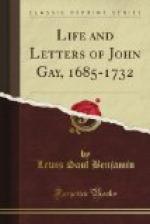[Footnote 1: Gay’s Chair, p. 13.]
[Footnote 2: Dictionary of National Biography.]
[Footnote 3: Gay’s Chair.]
[Footnote 4: Rural Sports.]
[Footnote 5: Spence: Anecdotes (ed. Singer), p. 13.]
[Footnote 6: George Cheyne (1671-1743), physician, practised first at London, and then at Bath.]
[Footnote 7: “The Epigrammatical Petition” is printed on p. 29 of this work,]
[Footnote 8: “Key to ‘Three Hours after Marriage,’” p. 7.]
[Footnote 9: John Freind (1675-1728), physician.]
[Footnote 10: Pope: Works (ed. Elwin and Courthope), VI, p. 123.]
[Footnote 11: Ibid., VI, p. 124.]
[Footnote 12: A reference to “The Mourning Muse of Alexis: A Pastoral Lamentary on the Death of Queen Mary.” In this piece the Queen is spoken of as “Pastora.”]
[Footnote 13: The references are to “Henry and Emma” and “Hans Carvel.”]
[Footnote 14: Pope: Works (ed. Elwin and Courthope), VI, p. 130.]
[Footnote 15: Pope: Works (ed. Elwin and Courthope), VII, p. 408.]
[Footnote 16: Ibid., VII, p. 409.]
CHAPTER III
1713
“RURAL SPORTS,” “THE FAN,” “THE WIFE OF BATH,” ETC.
There has been preserved a letter written by Aaron Hill to Richard Savage, June 23rd, 1766, which contains information concerning the life of the poet during the next two years. “I would willingly satisfy the curiosity of your friend, in relation to Mr. Gay, if it were not easy to get much further information than I am able to give, from Mr. Budgell or Mr. Pope; to the first of whom, the beginning of his life was best known, and to the last, its afternoon and evening,” Hill wrote. “As to your question, whether Mr. Gay was ever a domestic of the Duchess of Monmouth, I can answer it in the affirmative; he was her secretary about the year 1713, and continued so, till he went over to Hanover, in the beginning of the following year, with Lord Clarendon, who was sent thither by Queen Anne. At his return, upon the death of that Queen, all his hopes became withered, but Mr. Pope (who you know, is an excellent planter) revived and invigorated his bays, and indeed, very generously supported him, in some more solid improvements; for remember a letter, wherein he invited him, with a very impoetical warmth that, so long as he himself had a shilling, Mr. Gay should be welcome to sixpence of it, nay, to eightpence, if he could but contrive to live on a groat."[1]




